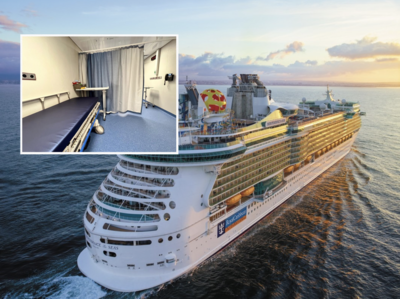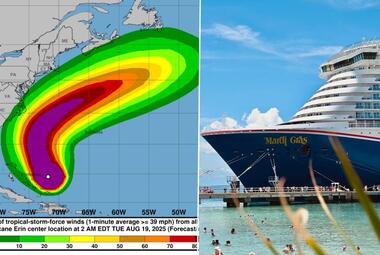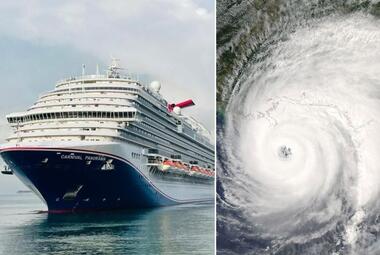Nobody wants to receive an unexpected bill on vacation. Unfortunately, that's exactly what happened to Vincent Wasney and his fiancée, Sarah Eberlein, while cruising on Royal Caribbean's Independence of the Seas. Before they were allowed to disembark, they had to pay over $2,500 in medical bills for services that Wasney received onboard as a result of a series of seizures.
Veteran cruisers advise first-timers to invest in travel insurance. While no future cruiser wants to think about the worst-case scenario occurring during their highly-anticipated vacation, unexpected events, such as the sudden onset of an illness, delayed flight, or death in the family, can result in trip cancellations and interruptions. Travel insurance helps provide financial protection, covering expenses incurred due to medical emergencies, lost luggage, and other unforeseen (and covered) circumstances.
As reported by KFF Health News and NPR, Wasney and Eberlein were looking forward to their first-ever cruise that was gifted to them by their real estate agent after they purchased their first home in Saginaw, Michigan in 2018.
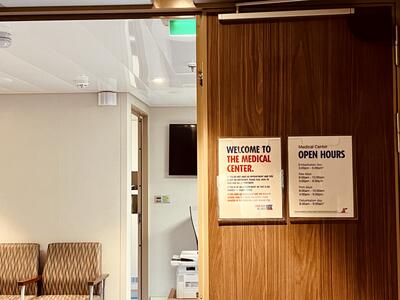
While visiting Perfect Day at CocoCay, Royal Caribbean's private island in The Bahamas, Wasney began feeling ill; however, it wasn't until the next day that symptoms became more severe. Eberlein heard Wasney make a pained noise before observing him having a seizure in bed. She recalled that blood was coming out of his mouth from him accidentally biting his tongue.
She left the cabin to find help and stumbled into another guest. They went to wake up their wife who just happened to be an emergency room physician. The ship's medical crew brought a wheelchair to their stateroom to transport Wasney to the onboard medical center. There, he received anticonvulsants and fluids before eventually being released.
A few hours later, he had a second seizure that caused him to stop breathing. His fiancée said that she remembered his lips being so purple that they almost looked black. As she went to find help, she forgot her SeaPass card, locking herself out of her stateroom. When the medical team entered the cabin, they found Wasney breathing; however, he had broken blood vessels on his neck and chest.
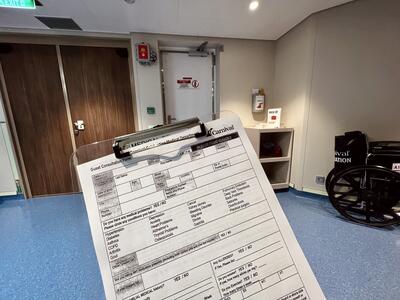
The third seizure, characterized as a grand mal seizure and known for causing a loss of consciousness and intense muscle contractions, occurred while Wasney was back in the onboard medical facility.
Since the ship was close enough to their disembarkation port in Florida, Wasney was able to be evacuated by rescue boat. However, they were first met with a $2,500.22 medical bill that covered his general and enhanced observation, a blood test, and anticonvulsant medicine, as well as a fee for services performed outside the medical facility.
According to the articles posted by KFF Health News and NPR, the general ward admission and observation came in at $2,285.78, with the i-STAT blood test, out-of-facility services, and medication costing $97.99, $104.55, and $11.90, respectively.
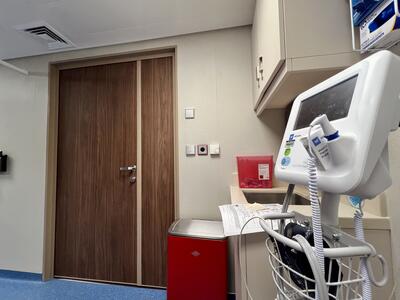
Not only that, but the couple had to settle their entire onboard account before disembarking, which included other charges like Wi-Fi. Wasney's GoFundMe stated that these costs amounted to roughly $300.
Though the events after his first seizure were groggy, Wasney remembered saying that he wasn't able to afford the bill. A cruise ship employee responded by asking, "How much can you pay?"
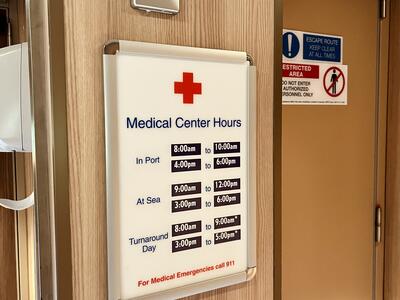
Royal Caribbean didn't provide any grace, with the company draining their bank accounts, as well as maxing out Wasney's credit card. In the end, the couple was still roughly $1,000 short; however, they later learned that his card was overdrawn to cover the shortage.
According to Royal Caribbean's Cruise Ticket Contract, all passengers agree "to pay in full...all charges for entertainment, goods, and services incurred by [the] Guest, or incurred by [the] Carriet on Guest's behalf." The Contract further states that the "Guest shall pay for all medical care or other personal services requested or required, whether onboard or ashore...If [the] Guest is unable to pay and the Carrier pays for such expenses, then [the] Guest shall reimburse [the] Carrier for those expenses."
Unfortunately, that wasn't where the medical debt ended. After he was back in Florida, he was transported to the emergency room at Broward Health Medical Center via ambulance.
Read more: 18 Surprising Things You Agree to in Your Cruise Contract
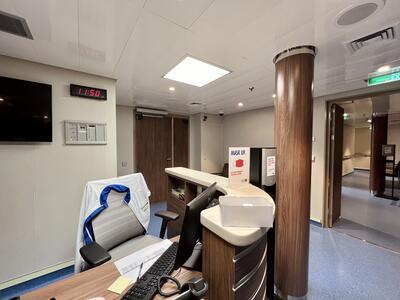
Though cruise ships don't accept typical insurance plans, Wasney was uninsured when they set sail, so he wasn't covered at the hospital in Florida, either. His plan wasn't set to begin until January 2023, the month after their return.
Those on the fence about purchasing travel insurance should take this as a warning
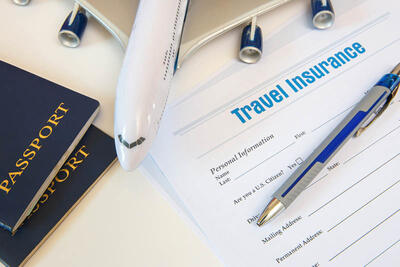
From lost luggage to medical evacuations, travel insurance plans provide financial peace of mind during stressful situations. Policy coverage varies from cruise line to cruise line, but you can typically expect some form of trip interruption protection, baggage protection, and medical evacuation protection.
If, for instance, you purchase insurance through Carnival Cruise Line, you'll receive up to $1,500 if your baggage is lost, stolen, or damaged, and up to $500 to buy necessary items if your bags are delayed over 24 hours, as well as up to $10,000 if you get sick or injured on your vacation and up to $30,000 for emergency medical evacuation and repatriation.
If you opt not to purchase travel insurance, it's important to read your provider's terms and conditions. Since you'll have to pay for any treatment received onboard, it's up to the company to determine whether or not you're eligible for reimbursement after you submit receipts. Many plans, however, don't cover medical services received on cruise ships.

Medicare will occasionally cover necessary services only if the ship is within six hours of a United States port. This means that if you're an American citizen on a European cruise or sailing to the Southern Caribbean, you're outside of the coverage zone. Moreover, passengers have travel insurance through their credit card providers.
Since you've paid for your well-deserved vacation, the last thing you want to happen is to run out of funds due to an unpredictable and unfortunate event. Though Wasney's case is an extreme example, it's impossible to predict whether you'll need medical attention due to an accident onboard or while in port.
Passengers with insurance should also travel with an emergency fund in place to cover unexpected expenses. Moreover, it's advisable to pack over-the-counter medications like cold & flu remedies, band-aids, pain relievers, cough drops, eye drops, antacids, and seasickness medication, as the ship's inventory is limited. Plus, you'll pay more than you would if you purchased them at your local drugstore.
Read more: Guide to annual travel insurance plans


